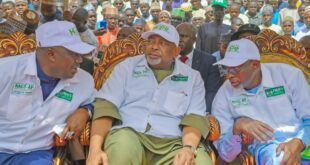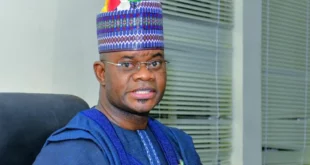The President of One Love Foundation, Chief Patrick Osagie Eholor has said that at 61 Nigeria is yet to achieve its potential describing it as a vehicle struggling to climb a hilly road.
Chief Eholor made this known while speaking with our Correspondent in Benin on Nigeria at 61.
He said that with mass unemployment and overstretching of inadequate and poorly maintained infrastructure, many Nigerians have had to seek their fortunes abroad.
He sadly pointed out that while smaller nations such as Ghana, Rwanda, Ivory Coast, Tanzania are beginning to catch up, at the same time big corporations from industrialised and wealthy countries in Europe and South Asia find the Nigerian business climate inauspicious largely due to decaying infrastructure, corruption and insecurity.
Chief Eholor said that big European corporations have over the years shut down or relocated their Nigerian manufacturing plants pointing to a lack of stable electricity supply and endemic corruption, both of which impede their smooth operations.
” By most standards of socio-economic development, Nigeria has not lived up to its potentials since becoming an independent country in 1960.
A nation with immense promises; 61 years after, Nigeria has become the world’s poverty capital with millions of her youths largely unemployed.
Over the years, the country rose to become the largest black nation on earth and steadily populated most corners of the earth with its brilliant people who have notably helped other countries succeed in the task of nation-building while their homeland ironically continued to fail on expectations”.
Continuing, ” Then the British colonial government gave up its rulership of the country in 1960, it was reportedly considered by many to be relatively ready and able to lead Africa and indeed the black race from the front. While there were talks about the country’s weak and largely undefined unity, the Prime Minister, Tafawa Balewa in his Independence Day speech delivered in Lagos, disclosed to the world that Nigeria was committed to leveraging its independence to become a responsible member to it then and in the future
Despite her immense natural and human resource endowments, sustained cases of poor political governance, abject poverty, pitiable electricity infrastructure, needless deaths from bad roads and ill-equipped hospitals, as well as incessant security challenges have dominated and kept Nigeria from living up to its prospects. Across its regions, states, villages and homes, citizens have grown weary and depressed of how badly the country is doing in key socioeconomic benchmarks”.
Chief Eholor disclosed that Nigeria built its first refinery in 1965, said as of today all the refineries built have been shut down due to mismanagement.
” Five years after its independence, Nigeria in 1965 built its first refinery at Alesa Eleme part of Port Harcourt, closer to most of the oil fields it earlier discovered. At the time it did, the refinery’s initial output was 38,000 barrels a day (bd) which was enough for the country to run its domestic economy. The capacity was however expanded to 60,000bd as demand and population increased.
The country entrusted the Nigerian National Petroleum Corporation (NNPC) to run the refinery as it indeed managed its hydrocarbon resources, and soon the corporation built another in Warri in 1979 with a 100,000bd production capacity, Kaduna and a second in Eleme in the 1980s.
Collectively the NNPC had a crude oil refining portfolio of 445,000bd capacity, and they adequately met Nigeria’s domestic demands for refined products at the time; excess outputs from the refineries were reportedly exported until in the 1990s when their production began to decline while the country’s population increased.
With time, NNPC’s four refineries could not supply Nigeria the volume of petroleum products its domestic economy demanded, and the country embraced importation as an alternative. It was for no reasons other than persistent corrupt management practices in the refineries’ business, absolutely poor maintenance culture as well as systemic adoption of all-around inept processes that the four refineries failed woefully and has now totally collapsed.
To keep refined petrol flowing in her domestic economy, the country yearly imports billions of litres of refined petrol, pay enormous financial subsidies to oil marketers to keep pump prices at government-regulated prices and sadly ship off to foreign countries millions of jobs that local refining of oil should have given to her growing population.
Recently, the Petroleum Products Pricing Regulatory Agency (PPPRA) disclosed that between 2006 and 2015 alone, Nigeria paid out N8.9 trillion on petrol subsidy. Without a doubt, business analysts believe that such monies could have remained within Nigeria if her refineries were up and running.
The government has also reportedly spent billions of naira, recently about N276 billion between 2015 and 2018, to repair the refineries without any results”.
He stressed that at 61 years as a sovereign nation, Nigeria from available data has been unable to provide electricity to 80 million citizens. According to records obtained from the World Bank, and which are comparable with that of the Nigerian Electricity Regulatory Commission (NERC), access to electricity in the country have remained extremely low with approximately 80 million people shut out from the national grid which has equally floundered on account of diversities of systemic challenges.
” The World Bank in an appraisal document is prepared following its intention to support the country’s power sector with funds to invest in an infrastructural upgrade, explained that Nigeria has the largest absolute electricity access deficit in sub-Saharan Africa.
The country, it stated is also the second-largest in the world, after India in this regard with its national electrification rate put at 55 per cent while rural electrification rate is only 39 per cent. Even in parts of the country where the national grid has gotten to, the NERC explained that supply stability is uncertain with an average of 4000 megawatts (MW) of electricity generated daily for supply to millions of connected citizens”.
He said according to the World Bank, to achieve universal access to electricity by 2030, “Nigeria would need to connect between 500,000 to 800,000 households per year. Both grid extension and off-grid solutions will be needed to provide quality services to unserved and underserved households and businesses in a timely manner.
Even though the country has privatised its electricity sector to infuse some level of efficiency, the NERC disclosed at the end of 2019 that just about 43 per cent of citizens connected to the national grid have electricity meters, leaving a 57 per cent metering gap in the sector”.
.
Chief Eholor who said that in 2018 Nigeria overtook India in the global poverty rate to become the world’s poverty capital pointed out that according to research, becoming the world’s poverty capital means that the largest number of people living in extreme poverty – 105 million, were in Nigeria which was about half of the country’s population.
He also said that the National Bureau of Statistics (NBS) confirmed the country’s slide into the world’s poverty capital maintaining that from their data, 82.9 million people of the country’s population are within the extreme poverty ring.
In addition to its status as the world’s poverty capital, Chief Eholor stressed that the country has also continued to record infant deaths albeit reports that over the past five years, infant and under-five mortality rates have remained steady at 74 and 117 deaths per 1,000 live births, respectively.
” According to the United Nations Children Fund (UNICEF), in every 13 new-born, one Nigerian child dies before reaching age one while one in every eight does not survive to their fifth birthday.
The UNICEF explained that infant and under-five mortality rates have both declined gradually over the past 25 years, down from 126 and 213, respectively, in 1990, but that they are closely related to key socioeconomic and geographic characteristics, which suggests that the country sliding into the world’s poverty capital could affect the statistics going forward. A child from the poorest 20 per cent of households is twice as likely to die before their first birthday or to die before their fifth birthday than a child from the wealthiest 20 per cent of households.”
This, He said in a way indicates that Nigeria in its 61 years as a nation has failed to create shared prosperity amongst its people.
Subscribe to the Advocate News letter and receive news updates daily in your inbox.
 Advocate.ng Latest news update on politics, entertainment, sport and more
Advocate.ng Latest news update on politics, entertainment, sport and more



